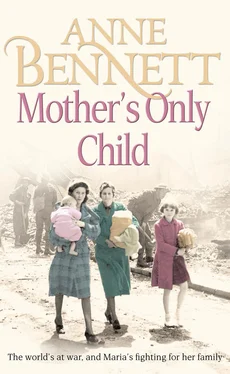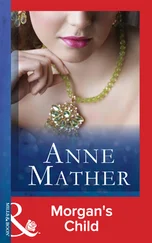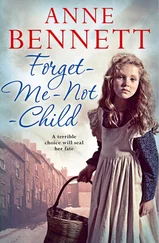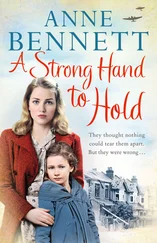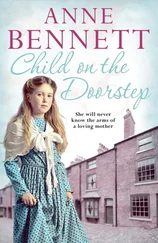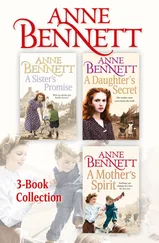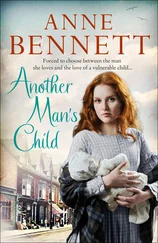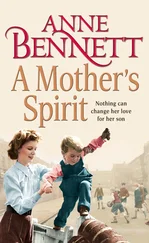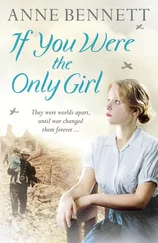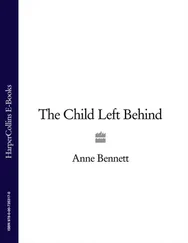Mother’s Only Child
Anne Bennett

This novel is entirely a work of fiction.
The names, characters and incidents portrayed in it are the work of the author’s imagination. Any resemblance to actual persons, living or dead, events or localities is entirely coincidental.
Published by HarperCollins Publishers Ltd 1 London Bridge Street London SE1 9GF
www.harpercollins.co.uk
This paperback edition 2005
SIXTH EDITION
First published in Great Britain by Harper CollinsPublishers 2005
Copyright © Anne Bennett 2005
Anne Bennett asserts the moral right to be identified as the author of this work
A catalogue record for this book is available from the British Library
All rights reserved under International and Pan-American Copyright Conventions. By payment of the required fees, you have been granted the non-exclusive, non-transferable right to access and read the text of this e-book on-screen. No part of this text may be reproduced, transmitted, down-loaded, decompiled, reverse engineered, or stored in or introduced into any information storage and retrieval system, in any form or by any means, whether electronic or mechanical, now known or hereinafter invented, without the express written permission of HarperCollins e-books.
Ebook Edition © NOVEMBER 2009 ISBN: 9780007355341
Version: 2017-09-13
This book is sold subject to the condition that it shall not, by way of trade or otherwise, be lent, re-sold, hired out or otherwise circulated without the publisher’s prior consent in any form of binding or cover other than that in which it is published and without a similar condition including this condition being imposed on the subsequent purchaser.
To my youngest daughter Tamsin, with all my love
Cover Page
Title Page
Dedication
Copyright
Chapter One
Chapter Two
Chapter Three
Chapter Four
Chapter Five
Chapter Six
Chapter Seven
Chapter Eight
Chapter Nine
Chapter Ten
Chapter Eleven
Chapter Twelve
Chapter Thirteen
Chapter Fourteen
Chapter Fifteen
Chapter Sixteen
Chapter Seventeen
Chapter Eighteen
Chapter Nineteen
Chapter Twenty
Chapter Twenty-one
Chapter Twenty-two
Chapter Twenty-three
Chapter Twenty-four
Chapter Twenty-five
Chapter Twenty-six
Chapter Twenty-seven
Chapter Twenty-eight
Chapter Twenty-nine
Acknowledgments
About The Author
Other Books By
About the Publisher
Maria Foley almost ran across The Square that day in late July 1941. The faint summer breeze riffled through her long wavy hair, tied back loosely with a ribbon the same green as her eyes. Bella McFee, catching sight of the girl, stepped out of the post office-cum-grocery shop when she saw the envelope in Maria’s hand.
‘It’s come then?’
‘Aye,’ Maria said. She tried to keep the elation out of her voice. ‘I’ve passed.’
She saw Bella’s lips purse in disapproval and, for a moment, Maria was resentful. She’d worked for Bella in the shop for two years. Couldn’t she just say she was the tiniest bit pleased? Congratulate her even?
Her mother, Sarah, had said the right words—‘Congratulations. You’ve done well’—but in a flat, expressionless and totally insincere tone. However, what Bella did say was, ‘I’m away to see your mother. She’ll likely be feeling low after this. Mammy will mind the shop. And where are you off to in such a tear? You’re not due in till nine.’
‘The boatyard,’ Maria said. ‘I want to see Willie.’
‘Oh, he’d like to know right enough,’ Bella said. ‘But you, Maria, aren’t you the tiniest bit ashamed, wanting to go to some fancy academy in Dublin just now, when you could be a help and support to your mother? Have you no thought for her, and you an only one too?’
Immediately, guilt settled between Maria’s shoulder blades. It isn’t my fault I’m the only one, she wanted to cry. That was the main problem, of course. If her mother had had a houseful of children, she could have taken pride in the fact that her eldest daughter had won a scholarship to the Grafton Academy in Dublin to study Dress and Fabric Design for two years.
But Sarah’s fall down the stairs when Maria had been just eighteen months old had killed the child she was carrying and assured there would be no more either. It had also, so it was said, given her ‘bad nerves’. Maria hadn’t known what ‘bad nerves’ were then, of course, although she knew her father was never willing to upset her mother and strongly discouraged Maria from saying or doing anything that might disturb her at all. She was well aware that the news that morning would have disturbed her greatly, and yet she couldn’t help being pleased and, yes, proud of herself. She knew Willie would congratulate her warmly and, oh God, how she needed someone on her side for once.
‘Mammy should never have let me go in for the exam if she can’t take any joy in the fact that I have passed it,’ Maria said.
‘You don’t understand anything yet, girl,’ Bella said sharply.
Maria flushed at the sharp tone and then tossed her head a little defiantly and said, ‘I have to go, or I’ll be late getting to the shop.’
Before Bella could say another word, Maria gave her a desultory wave and ran over the green to the coastal path, which ran to Greencastle, the next village up Inishowen Peninsular. It was the path her father used to take every day bar Sunday, when he’d owned a boatyard in the small village. Now he worked at the Derry docks, and Willie Brannigan was put in charge of the Greencastle boatyard. He’d known Maria since the day of her birth and she knew he’d wish her well.
She paused on the banks of Lough Foyle, the sun, warm on her back from a cloudless sky, glittering on the water. Well, what could be seen of the water. The lough was so filled with naval craft, she could barely see Milligan’s Point on the further side, the side the British still owned. She couldn’t see the airports at Limavady and Eglinton either, but she knew they were there. It was a fine sight to see the aircraft flying above the flotilla of naval vessels on convoy duty. Her father said they were more effective at sinking German U-boats than the ships. The British-owned six counties had been dragged into the war along with Britain, but the Free State, Maria’s side of the border, had declared itself neutral and Maria knew there were soldiers from the Irish Army stationed at Buncrana, which was the other side of the peninsular, to try to ensure the Germans respected that neutrality
She gave a sigh and made her way to the boatyard. For a moment she wished Greg Hopkins was just a couple of miles away on his father’s farm and she could rush to him with her news, for he was another one who believed she was doing the right thing. He was in the army now and, though she was proud of him, she missed him sorely. Letters couldn’t make up for his absence.
It was strange how she and Greg had always been such friends, because Greg hadn’t been born in Inishowen at all, but in Birmingham, England, where his father came from, though his mother was from Moville.
The whole family had arrived in 1934 when Greg’s mother inherited a farm from an uncle. Maria had only been nine, and Greg thirteen, but she remembered the lost and unhappy boy he was then, who made no effort to make friends. He was like a fish out of water, her mother would say.
Читать дальше
